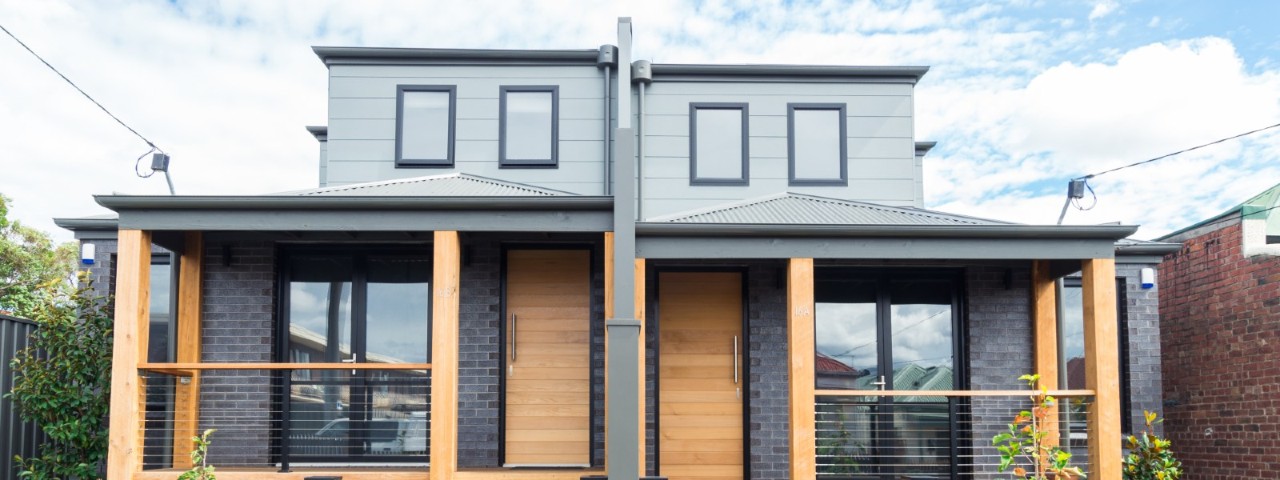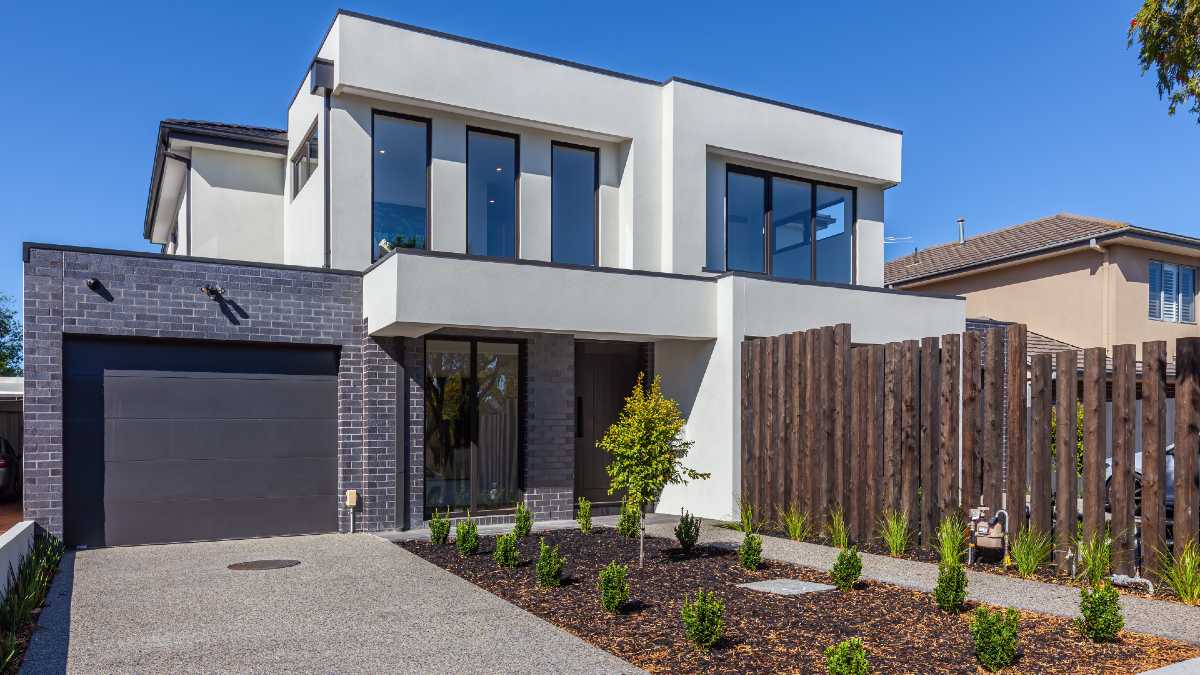Downsizing to an apartment offers numerous advantages, making it an appealing choice for those seeking a simpler and more cost-effective lifestyle.
What is a duplex and how do you insure one?

Whether you're a first-time homebuyer, investor or simply exploring your options, the duplex is a way to maximise living space while minimising costs. Find out more with this handy guide.
As urban areas continue to grow and housing demands increases, innovative housing solutions are becoming popular. Thanks to the duplex residential building, it is possible to build two homes instead of one on a block of land.
If you're considering a redevelopment or have a block of land, you might consider building a duplex. But along with building regulations and local zoning, there are a variety of factors you'll need to think about, including insurance and strata fees. Here's what you need to know about duplexes.
What is a duplex?
A duplex is a residential building containing two homes that share a common wall but sits on separate titles. A duplex may look like one house, but it's really two homes that share the same roof and are mirror images of one another.
The duplex design mostly appeals to downsizers and investors, but a dual occupancy could also work well for some homeowners, landowners and prospective home buyers.
Essentially, building a duplex allows you to divide one piece of land into two. And you can subdivide, meaning you have two separate properties on one block. This means that a duplex can help homeowners unlock hidden equity in their property by changing their single occupancy into a dual occupancy, providing income opportunities as a landlord or the chance to have family next door.
Best of all, a duplex can be cheaper to build than two separate houses.
Bear in mind, building a duplex is not a DIY type of project. You’re going to need to call in the experts.
What are the benefits of a duplex?
The benefits of building a duplex are endless. For starters, a duplex approach enables the home buyer to contemplate purchasing in exclusive neighbourhoods and build at a lower price - a real alternative to downsizing to an apartment.
A duplex can also be a great approach given that adult children are struggling to get into the Australian property market. This means multi-generational families can essentially live under the one roof, while also having privacy.
Other times, the person building the duplex will live in one side and sell the other side.

A duplex consists of two homes that share a common wall, but sit on different titles. Image: Getty
How much land do you need for a duplex home?
Whether or not you can build a duplex will come down to the size of the block that you’ve purchased. You need a wide block of land to be able to fit a duplex, and you will need to give careful consideration to the layout of each property to see if it will work on the block.
While large blocks in Melbourne's middle and outer suburbs are well suited to side-by-side duplex development, many homes in inner-city Melbourne don’t have the width to allow for a duplex. However, it is possible to build a duplex one behind the other, with the driveway on one side. The downside of this is that the back home doesn’t have street appeal, which counts for something when considering resale.
What should I consider when designing a duplex?
When designing the layout of a duplex, it’s important to consider the configuration of each property, including elements such as privacy, window placement, configuration and natural light.
Depending on local regulations, duplexes are usually double storey, but even three-storeyed designs can receive approval, depending on your suburb.
If you’re investing, the good news is that a duplex can produce strong growth and healthy rental yields for less than the cost of two similarly located detached homes.
How much does building a duplex cost?
It's important to be aware that the cost of building a new home or duplex can be influenced by a variety of factors, including trade shortages, increasing energy costs, architectural details and luxury finishes, for example. As a rough guide, the cost to build a three- to four-bedroom duplex in Melbourne is around $350,000 to $450,000 per dwelling ($700,000 to $900,000 for the two homes) depending on the location, size and finish.
Do duplexes have strata fees?
Both dwellings in a duplex are constructed at the same time, but depending on the title structure, they may be strata or non-strata titled.
Under a strata title arrangement, you own your individual unit but share ownership of the common property with the other unit owner. Each owner pays strata fees to cover the costs of maintaining and managing these common areas.
If your duplex is non-strata titled, you are exempt from strata fees.
Can you sell half or both parts of a duplex?
Whether you can sell only one half of a duplex depends on whether your duplex is strata titled or not. If strata titled, you can sell and own one dwelling in the duplex. If non-strata titled, you must sell or own both dwellings in the duplex.
How do you insure a duplex?
In general, when insuring a duplex, the owner will need a building insurance policy that covers both dwellings/lots because they share a wall.
The occupants can take out contents insurance for their items.
If there is a strata title arrangement, you will need a strata (body corporate/owners corporation) insurance policy. Minimum owners corporation insurance requires public liability insurance for common property and building insurance for buildings on common property.
What is stamp duty like a duplex?
Land transfer duty (also called stamp duty) is paid when you buy or acquire a property. It's calcuated on the dutiable value of your property (whichever is greater of the price you paid for the property or its market value). Stamp duty is usually between 1.4 and 6.5 per cent of the dutiable property value.
You can calcuate your stamp duty here. You may also be eligible for an off-the-plan duty concession.
Are duplexes cheaper than apartments or townhouses?
A duplex is typically more expensive to buy or build than a single apartment or townhouse, but cheaper than two apartments or townhouses to result in two dwellings like a duplex offers. A duplex can also offer a good source of income, since you can live in one dwelling and rent out the other.

When designing a duplex, it's important to consider privacy and natural light. Image: Getty
Can you turn a duplex into a single home?
You can generally convert a duplex into a single-occupancy home, but you may be better off selling your duplex and purchasing a house. Turning a duplex into a single home is a lot of work, from consulting your local authorities about what kind of permits you will need to demolishing the separating wall to coming up with a new floorplan for the house.
Are duplexes soundproof?
In general, there is more risk of sound transfer in a duplex than in, for example, two neighbouring houses. In the construction stage, additional soundproofing measures like double-glazed windows and insulation can help.
What are the downsides of owning a duplex?
Whether or not a duplex will work for you depends on your personal situation.
The shared wall could impact your quality of life if you end up with inconsiderate or loud neighbours.
Duplexes are sometimes on one title, meaning both halves must be sold together. If a duplex is subdivided into two separate titles, each home can be sold separately.
There can also be additional costs to build a duplex, so don’t get caught out. These extra costs can include tax costs, civil engineering costs and the connection of services, levies and taxes. So, make sure you crunch the numbers first. Contact the relevant authority for more details.
Make sure you speak to a residential home building expert and weigh up the decision to construct a duplex. While duplexes are a great opportunity for many, they may not work for everyone.
The information provided is general advice only. Before making any decisions please consider your own circumstances and the Product Disclosure Statement and Target Market Determinations. For copies, visit racv.com.au. As distributor, RACV Insurance Services Pty Ltd AFS Licence No. 230039 receives commission for each policy sold or renewed. Products issued by Insurance Manufacturers of Australia Pty Ltd ABN 93 004 208 084 AFS Licence No. 227678.


